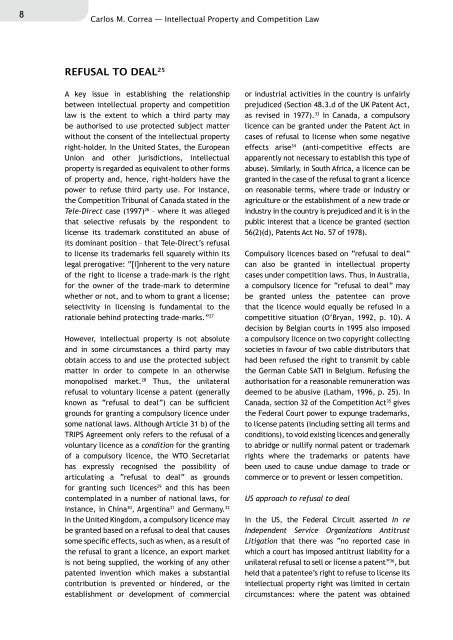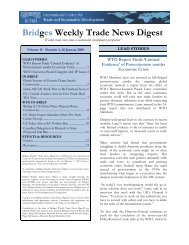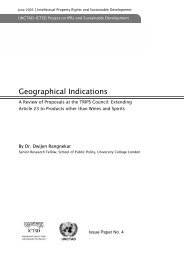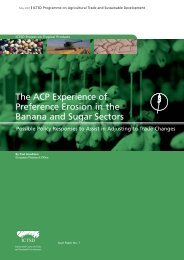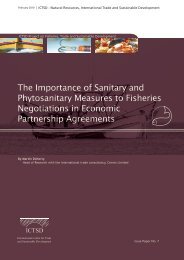Intellectual Property and Competition Law - IPRsonline.org
Intellectual Property and Competition Law - IPRsonline.org
Intellectual Property and Competition Law - IPRsonline.org
You also want an ePaper? Increase the reach of your titles
YUMPU automatically turns print PDFs into web optimized ePapers that Google loves.
Carlos M. Correa — <strong>Intellectual</strong> <strong>Property</strong> <strong>and</strong> <strong>Competition</strong> <strong>Law</strong>Refusal to Deal 25A key issue in establishing the relationshipbetween intellectual property <strong>and</strong> competitionlaw is the extent to which a third party maybe authorised to use protected subject matterwithout the consent of the intellectual propertyright-holder. In the United States, the EuropeanUnion <strong>and</strong> other jurisdictions, intellectualproperty is regarded as equivalent to other formsof property <strong>and</strong>, hence, right-holders have thepower to refuse third party use. For instance,the <strong>Competition</strong> Tribunal of Canada stated in theTele-Direct case (1997) 26 – where it was allegedthat selective refusals by the respondent tolicense its trademark constituted an abuse ofits dominant position – that Tele-Direct’s refusalto license its trademarks fell squarely within itslegal prerogative: “[I]nherent to the very natureof the right to license a trade-mark is the rightfor the owner of the trade-mark to determinewhether or not, <strong>and</strong> to whom to grant a license;selectivity in licensing is fundamental to therationale behind protecting trade-marks.” 27However, intellectual property is not absolute<strong>and</strong> in some circumstances a third party mayobtain access to <strong>and</strong> use the protected subjectmatter in order to compete in an otherwisemonopolised market. 28 Thus, the unilateralrefusal to voluntary license a patent (generallyknown as “refusal to deal”) can be sufficientgrounds for granting a compulsory licence undersome national laws. Although Article 31 b) of theTRIPS Agreement only refers to the refusal of avoluntary licence as a condition for the grantingof a compulsory licence, the WTO Secretariathas expressly recognised the possibility ofarticulating a “refusal to deal” as groundsfor granting such licences 29 <strong>and</strong> this has beencontemplated in a number of national laws, forinstance, in China 30 , Argentina 31 <strong>and</strong> Germany. 32In the United Kingdom, a compulsory licence maybe granted based on a refusal to deal that causessome specific effects, such as when, as a result ofthe refusal to grant a licence, an export marketis not being supplied, the working of any otherpatented invention which makes a substantialcontribution is prevented or hindered, or theestablishment or development of commercialor industrial activities in the country is unfairlyprejudiced (Section 48.3.d of the UK Patent Act,as revised in 1977). 33 In Canada, a compulsorylicence can be granted under the Patent Act incases of refusal to license when some negativeeffects arise 34 (anti-competitive effects areapparently not necessary to establish this type ofabuse). Similarly, in South Africa, a licence can begranted in the case of the refusal to grant a licenceon reasonable terms, where trade or industry oragriculture or the establishment of a new trade orindustry in the country is prejudiced <strong>and</strong> it is in thepublic interest that a licence be granted (section56(2)(d), Patents Act No. 57 of 1978).Compulsory licences based on “refusal to deal”can also be granted in intellectual propertycases under competition laws. Thus, in Australia,a compulsory licence for “refusal to deal” maybe granted unless the patentee can provethat the licence would equally be refused in acompetitive situation (O’Bryan, 1992, p. 10). Adecision by Belgian courts in 1995 also imposeda compulsory licence on two copyright collectingsocieties in favour of two cable distributors thathad been refused the right to transmit by cablethe German Cable SATI in Belgium. Refusing theauthorisation for a reasonable remuneration wasdeemed to be abusive (Latham, 1996, p. 25). InCanada, section 32 of the <strong>Competition</strong> Act 35 givesthe Federal Court power to expunge trademarks,to license patents (including setting all terms <strong>and</strong>conditions), to void existing licences <strong>and</strong> generallyto abridge or nullify normal patent or trademarkrights where the trademarks or patents havebeen used to cause undue damage to trade orcommerce or to prevent or lessen competition.US approach to refusal to dealIn the US, the Federal Circuit asserted In reIndependent Service Organizations AntitrustLitigation that there was “no reported case inwhich a court has imposed antitrust liability for aunilateral refusal to sell or license a patent” 36 , butheld that a patentee’s right to refuse to license itsintellectual property right was limited in certaincircumstances: where the patent was obtained


